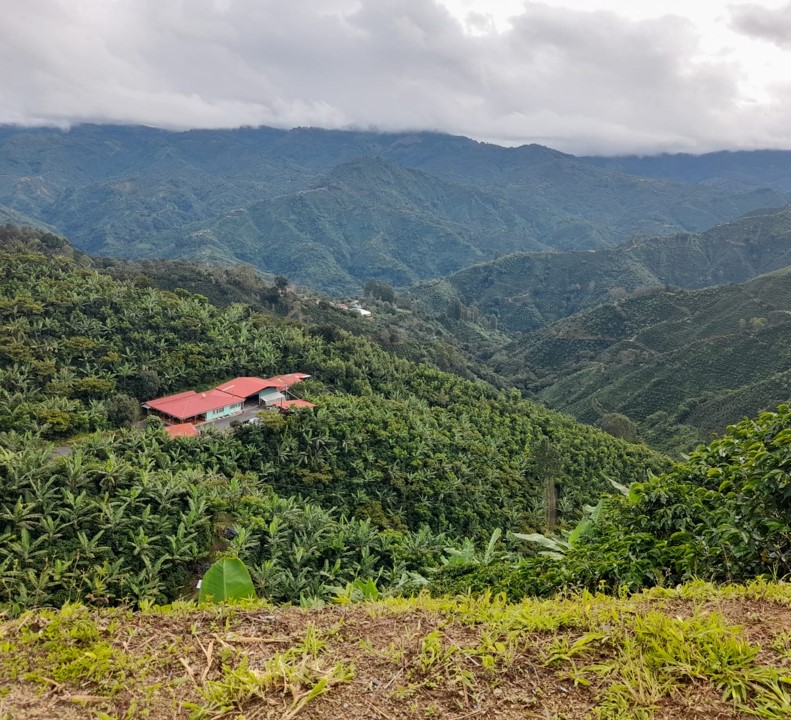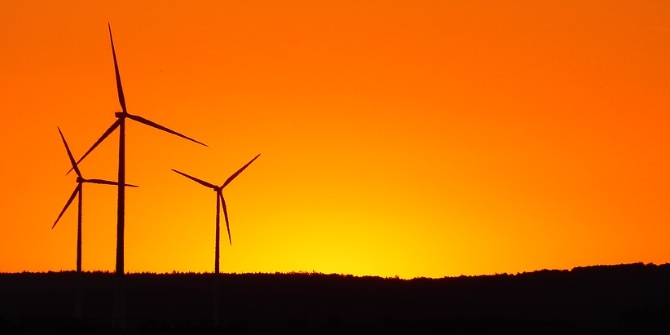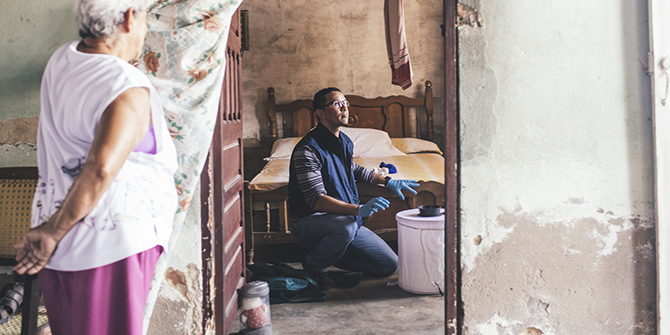Single-origin coffee beans are usually sold at premium prices and are considered at the higher end of the market. For the past year, Layla Zaglul Ruiz (LSE Latin America and Caribbean Centre) has been carrying out ethnographic research on how consumer trends affect small-scale producers’ lives.
Lee este post en español
I’m sitting in one of Brighton’s many cafes in the hipster-filled North Laine district. The waiter brings me my coffee, accompanied by a card with a QR code with information about the beans. Scanning the code, I’m given a lengthy description of the farmer whose beans I’m now drinking: a Costa Rican man named Don Francisco who inherited four hectares of land from his parents, which he now runs with the help of his wife and children. The particular beans I’m drinking have come from a one-hectare plot of land within his farm, planted with red and yellow Catuai trees.
For the past year, I have been carrying out ethnographic research on how these consumer trends are affecting the lives of producers like Don Francisco. Through this work, I have come to understand that while the myth of the small-scale farmer is a useful marketing tool, the demand for ‘single origin’ coffee is, in fact, creating a model that is unsustainable for small-scale growers.
In the past twenty years, a heightened interest in consuming ‘quality coffee’ has created new approaches to trade. In today’s coffee industry, there are categories that prioritise different aspects of the product. Coffee researchers distinguish three current major waves of coffee consumption. The first wave normalises coffee, moving it from an exotic product to part of everyday consumption. The second and third waves emphasise quality. And the third wave, particularly, pays close attention to high altitude, single-origin and rare varieties.
My study focuses on single-origin coffee (which falls under the third wave), associated today with independent coffee shops and small-holding growers. Today, single origins are the fastest-growing segment of the market. Single origins include micro-lots which are unique plots of coffee with extraordinary micro-climates providing more precise traceability, like the one I had at the coffee shop in Brighton. These beans are usually sold at a premium price and are considered at the higher end of the market. For the last decade, micro-lotting and micro-mills have represented an alternative for producers in countries like Costa Rica to add value to their coffee.
Third-wave coffees, particularly micro-lots, have given growers a new-found enthusiasm towards production with the promise of better ways of trading coffee. But despite these beans being sold at premium prices, many producers still struggle to sustain their businesses. Edward Fischer (2019) argued that the strain in producers’ returns is rooted in value distribution. He claims that ‘the largest percentage of economic value accumulated from the rarefied prices of third wave coffees come not only from the control of the terroir but also from translating material qualities into symbolic and imaginative domains’.
Third-wave coffee has created new metrics of quality that focus on origin, exclusivity, and narratives. These metrics are led by symbolic values that are ever-changing. For instance, an important aspect of micro-lots and single origins is to produce distinctive flavours. For this, different post-harvest processes are applied (e.g., natural or honey) as opposed to the more conventional washed method. These are sometimes new or recently rehabilitated processes which, in the past, were for artisanal rather than industrial use. Who determines that these processes are now valued? In large part, roasters, baristas, and coffee cuppers, many of whom are part of the most profitable section of the coffee chain. These Third Wave coffee players not only accumulate material means but also dictate what is valuable within this system.

Symbolic value and its disadvantages
My study is based on 50 interviews with coffee producers and participant observation in Costa Rica and took place over one year with three field trips. I found that many of the symbolic values of the third-wave coffee trends that make these products attractive – or add symbolic value– are at the same time putting growers in a disadvantaged position. There is a disruption between the symbolic value spheres and the reality of the growers, which is unfavourable for those at the tail end of the value chain.
The first disruption I found is between small-holding growers and the desire to pursue rare varieties. As mentioned above, third-wave coffee is associated with small-scale farmers. At the same time, rare arabica varieties (e.g., Geisha) and more labour-intensive post-harvest processes are highly valued. The problem is that small-scale producers are at risk when experimenting with new varieties that might not give them the expected results (e.g. low productivity) and have a small room (fewer than two hectares) to keep their production afloat. On the other hand, medium size and economically stronger growers have the space and solvency to gamble with the unknown of rare varieties.
Another critical disruption is the campaigns associating single origin, particularly micro-lots, with solidarity and direct trade ideas. The extensive personal narratives presented in packaging, coffee shops and websites suggest closeness between the consumer and producer, as well as an idea of cohesion. However, the single-origin model often disintegrates cooperatives and turns growers to the individualistic entrepreneurship model. This is especially true in the case of coffee micro lots in which coffee producers are encouraged to construct their own micro mills as roasters and importers prefer to buy coffee manufactured by the growers themselves so that they can experiment with unique post-harvest methods and secure total control of traceability. This leads to producers with micro-mills selling all their harvest to their new clients and abandoning their cooperatives. Consequently, cooperatives are losing members and, more importantly, members with the highest coffee quality.
Third-wave coffee places value in symbolic domains such as tradition, provenance, and personal narratives of small-holding growers, giving an impression of egalitarian relationships and solidarity. On the other hand, coffee consumers are encouraged (led by marketing discourse) to chase unusual flavours and rare varieties, which disadvantages small producers. These disruptions have made the success stories of small, family-run farms in third-wave coffee an exception instead of the rule. As I sip my coffee in Brighton’s trendy North Laine district, I can’t help thinking of all the small farmers in Don Francisco’s area who didn’t make it onto the QR code.
Notes:
• The views expressed here are of the author rather than the Centre or the LSE
• This post is based on the research project ‘Adding value to coffee and Cacao in Latin America’. The project will provide an anthropological study of the recent trends in Latin American export crops towards small-scale, high-quality production, using the examples of coffee micro-lots in Costa Rica and fine cacao production in Peru.
• The Canning House Forum is a partnership between the LSE Latin American and Caribbean Centre and Canning House that aims to promote research and policy engagement around the overarching theme of “The Future of Latin America and the Caribbean”.
• Please read our Comments Policy before commenting
• Banner image: Costa Rica, coffee beans that ripen on plantations / Alessio Calviani (Shutterstock)





